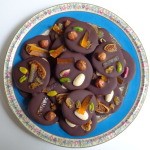 Sometimes words beggar translation. I can remember, as a student of French, being taught that gourmet meant someone with a discriminating palate, but gourmand meant a glutton. So you can imagine my confusion when, aged 25, out to dinner in Paris with my new French boyfriend, he exclaimed, ‘Mais tu est gourmande!’ And all I’d ordered was a dandelion salad and a lime sorbet. But the translation, it turned out, was wrong…
Sometimes words beggar translation. I can remember, as a student of French, being taught that gourmet meant someone with a discriminating palate, but gourmand meant a glutton. So you can imagine my confusion when, aged 25, out to dinner in Paris with my new French boyfriend, he exclaimed, ‘Mais tu est gourmande!’ And all I’d ordered was a dandelion salad and a lime sorbet. But the translation, it turned out, was wrong…
So it is with the French holiday chocolates called mendiants, a word that translates literally as ‘beggars’ and conjures up street people living rough. How could such a sublime confection — a palette of rich dark chocolate topped with coloful dried fruit and nuts — have received such a lowly name?
Mendiants / Chocolate mendiants
The answer goes back to the Middle Ages, when four French orders of monks were known as mendiants — mendicants — because they lived entirely from charitable donations. Over time they lent their name to an assortment of dried fruits and nuts served at the end of a meal, each item associated with the color of the monks’ robes: almonds for the Carmelites, figs for the Franciscans, hazelnuts for the Augustins, and raisins for the Dominicans.
Today the word mendiants refers to two fruit-and-nut mixtures — not just the studded chocolates, which are typically served over the Christmas season, but also a cocktail mix of salted nuts and dried fruit that is served year round. Both use a wider variety of nuts and fruit than in the old days, which lends a certain charm if you make your own. (Another advantage of making your own chocolate mendiants is that it’s far less costly than buying them in a shop, where prices can be sky-high.)
I tend to associate the chocolate mendiants seen over the holidays with the tradition in Provence of serving 13 desserts at Christmas dinner. According to Andrée Maureau, author of the wonderful cookbook Recettes en Provence, the 13 represent Jesus and the 12 apostles. A typical Marseille assortment, she says, would be: raisins, dried figs, almonds, walnuts, plums, pears, apples, candied citron, quince jam, light nougat, dark nougat, winter melon and pompe or fougasse, sweet cakes made with olive oil and orange.
Here in Paris we don’t get that elaborate, preferring the simplicity of chocolate mendiants. They are a breeze to make, and it’s a family-friendly activity. Everyone can get in on the fun. So treat yourself this winter, and don’t worry — if you enjoy the festive chocolates you may be gourmand, but you are not a glutton. As it turns out, the word means — in this context — someone who enjoys the pleasures of the table.
Happy cooking!




